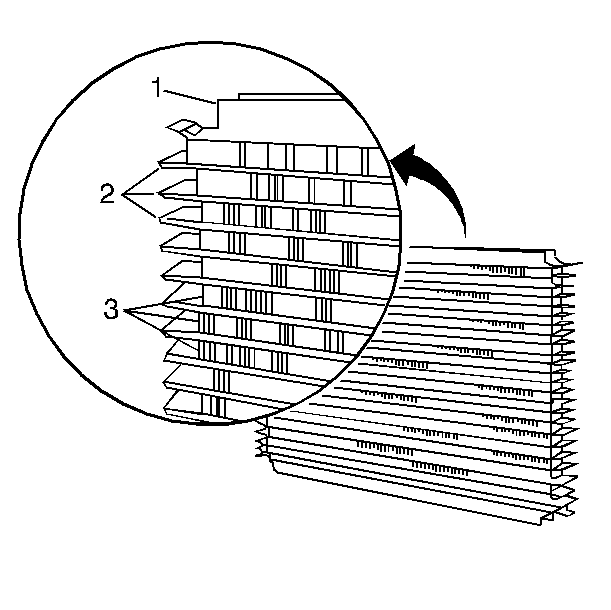These engines use a cross-flow, lightweight aluminum and plastic radiator.
| • | A brazed aluminum tube and center core. |
| • | Two plastic end tanks. |
| • | A transmission oil cooler. |
| • | An engine oil cooler. |
| • | A radiator drain plug. |
Clinch tabs fasten the end tanks to the core. A high temperature rubber gasket seals each of the end tanks. The right side end tank houses the transmission oil cooler. The left side end tank houses the engine oil cooler. Rubber gaskets and nuts seal the oil cooler fittings to the end tanks. The drain cock is plastic and this is at the bottom of the left side end tank.
Cross-Flow Radiator Core and Outlet and Inlet Tanks

These models have an aluminum, cross-flow design core (1). The core uses a stack of horizontal tubes (2) that resist plugging. The cooling fins (3) surround these tubes. The top and bottom ribs strengthen the assembly. The saw-cut in each strengthening rib allows for expansion during temperature changes.
The inlet and the outlet tanks are molded from high-temperature, nylon reinforced plastic. A high-temperature rubber gasket seals the tank flange around the edge. The inlet and the outlet tanks are clamped to the right side and the left side of the core with clinch tabs. These tabs are part of the aluminum header at each end of the core. Radiators used with automatic transmissions have transmission oil coolers with inlet and outlet fittings for transmission fluid circulation.
You can identify an aluminum-plastic radiator by the black plastic side tanks and an aluminum radiator core.
Engine Oil Cooler
The 3.8L comes with an optional engine oil cooler which uses engine coolant flowing through an oil cooler at the oil filter.
Radiator Drain Cock
The radiator drain cock is on the bottom, left side of the radiator end tank. The drain cock includes the drain cock and the drain cock seal. Use the drain cock when you drain the coolant.
